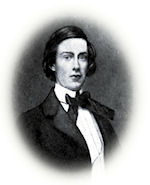
Care of Lieut. S. R. Elliott,
10th Co., 79 Regiment, Virginia.
Glebewood, Virginia, July 8th, 1861.
My Dear Mother:
You see from the above that the “sacred soil” continues to be invaded. General Scott is inexorable, so, notwithstanding the protests of the States Right supporters, Regiment after Regiment crosses the line, and the sanctity of the Old Dominion is violated by the desecrating footsteps of the ruthless horsemen. Yesterday we left Georgetown and after two hours march arrived at our present camping ground. A romantic scene it was last night, arriving as we did at an evening hour. But our advent was followed by a dreadful act of destruction! The ruthless invaders charged with full force upon a snake-fence, demolished it, laid the pieces upon four different piles, and set to them the incendiary torch; soon our camp fires were blazing. The men fell into groups, some song-singing, some keeping guard, while here and there hoarse laughter showed that the solemnity of invading the sacred soil did not entirely prevent the outburst of unseasonable hilarity. Then the stars shone brightly, and the comet whisked its tail for us, and the tattoo sounded for sleepy souls to say their prayers before sinking into slumber. But when all was ready, the baggage-wagons were still far from us, lagging sadly behind, so we had no tents to cover us, but lay in the long grass looking upward at the silent stars. Those of us who had brought our blankets were fortunate, those of us who had trusted, in an unsoldierly way, for the wagons to bring them to us, and I was one of those, could do naught else than lie without any barrier between us and the bare soil — “sacred soil” — stickey, clayey soil it was too — of the “Sovereign State of Virginia.” Owing to its quality much of it stuck to us, but it being the real “sacred” stuff you know, made us regard our soiled garments with becoming reverence. We woke early this morning, you can imagine, as the sun rises hot in these regions, but we woke in excellent spirits. Our poor little Lieutenant was found after the Reveille, still enjoying his morning dreams. “Fence him in!” the Captain orders. With the greatest alacrity a couple of men took some rails, and while the youth still slept, built a sort of a chicken-coop around him.
Then a circle laughing and employing derisive epithets was formed about the unfortunate. At these unwonted sounds our little Lieutenant awoke, looking irresistibly comical, in a state of utter bewilderment. As he released himself from his confinement, he looked so pitiable that the mirth excited was only the more increased.
I saw Ned Tyler yesterday. He is looking well. Much better than I had expected. We had a pleasant time together, though our interview was interrupted by our march hitherward. Major-General Tyler, who is to command our Division I believe, also looked well — and full of business.
Good-bye, Mother. In these times let us put our trust in God and accept the inevitable.
Very affectionately,
Willy.
________
“The 79th Highlanders,” p. 16.
About July 12th, Col. W. T. Sherman was made commander of the brigade of which the 79th Highlanders formed a part, while Brigadier-General Daniel Tyler of Connecticut, commanded the division.


